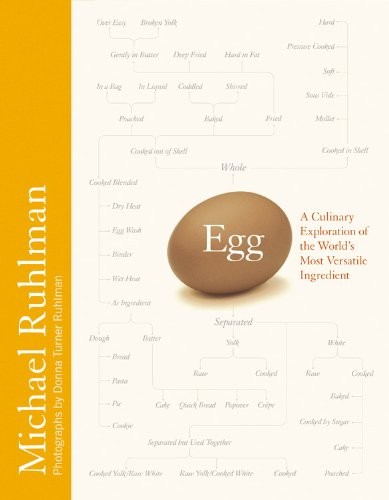Michael Ruhlman extolls the virtues of the egg
April 14, 2014 by Jane
Michael Ruhlman is an award winning writer whose cookbooks cover numerous subjects ranging from charcuterie to the importance of ratios. While the chicken (more precisely the chicken fat) may have come before the egg in his writing, he gives the egg its due with his latest work, simply titled Egg. Ruhlman graciously took time from his book tour to answer several questions posed by EYB.
You can enter our contest for a chance to win a copy of Egg.
EYB: Do you have a view on which of the many
variables of eggs – organic, free-range, cage-free, Omega-3,
pasteurized, etc – are the best for eating (and kindness to
animals)?
I’m wary of all health claims beyond this one: eggs are nutritious
and delicious food. My intuition is that eggs from chickens raised
by a local farmer, chickens allowed to forage on fertile clean
pasture, will be the most nutritious and delicious of all. If you
care about the welfare of the chicken, same goes, though you do
have the option of seeking out cartons that are labeled certified
humane. Omega 3 eggs apparently may have more omega 3 fatty acids,
supposed to be good for you. Are they? Your guess is as good as any
nutritionist’s. As a rule all eggs are going to be fairly similar
from a nutrition standpoint, with small variations.
Do you have any idea how many eggs you used while
developing the recipes in this book?
No! Cartons and cartons of them. And with very little waste.
What new ways of using eggs are readers of this book
likely to discover?
There are no new ways of using eggs, which have been around well,
for some time now. (The chicken came first, by the way, but a very,
very long time ago.) Unless you include that weird egg extruder
demonstrated by Stephen Colbert [on The Colbert Report].
What readers of this book will find, to their astonishment, I hope,
is the amazing variety of ways this single and singular object can
be put to use, whether as the focal point of a dish or a mechanical
tool for some unforeseen effect (the egg whites capacity for
clarifying a stock for consommé for instance).
 How much
do you explain about the science of cooking with
eggs?
How much
do you explain about the science of cooking with
eggs?
Only insofar as it teaches a technique or helps us to understand
why a preparation works as it does. Why the amount of water in a
yolk-emulsified sauce is more critical to the sauces stability than
the amount of yolk, for example. Any areas where the a student
reader wants more, I direct them to McGee’s unparalleled On
Food and Cooking.
What are your personal favorite and least favorite
methods of cooking eggs?
My favorite ways of cooking eggs is using gentle heat on a whole
egg, or a whole egg blended–poached, scrambled fried over easy,
and the like: ways that feature the egg. I can think of no ways I
don’t like cooking eggs. I don’t like being on the receiving end of
a thrown raw egg in its shell.
We know from your blog that you love cocktails – are
there any cocktails using egg whites in the
book?
Yes! I’ve included a Clover Club cocktail in the book, a sweet and
sour gin-based concoction that gets its body from egg whites. I
also couldn’t resist three very different eggnog
preparations.
Your last book was Schmaltz, about chicken
fat. Now we have Egg. What’s
next?
A series of short single subject cookbooks focusing on a specific
technique–roast and then braise are slated for next fall and the
following spring, respectively.
Believe it or not, there are some people who don’t
like eating eggs – what recipes in the book are likely to change
their minds?
I like to think that if I personally scrambled eggs for such a
human, I could change their mind. If that didn’t work, I’d make
them a Clover Club.
Categories
- All Posts (7076)
- Antipasto (2206)
- Author Articles (250)
- Book News (944)
- Cookbook Giveaways (996)
- Cookbook Lovers (262)
- Cooking Tips (116)
- Culinary News (299)
- Food Biz People (558)
- Food Online (800)
- Holidays & Celebrations (277)
- New Cookbooks (154)
- Recipes (1520)
- Shelf Life With Susie (231)
- What's New on EYB (134)
Archives
Latest Comments
- Kisa on French at Heart – Cookbook Giveaway
- smcculle on French at Heart – Cookbook Giveaway
- SULouisville on Balli Balli – Cookbook Giveaway and Quick Bites
- SULouisville on 20 Amici – 40 Ricette Cookbook Giveaway
- SULouisville on French at Heart – Cookbook Giveaway
- SULouisville on French at Heart – Cookbook Giveaway
- JimCampbell on Food news antipasto
- Indio32 on Four outstanding independently published cookbooks worth your attention
- nvernon on Four outstanding independently published cookbooks worth your attention
- fayegibson on Four outstanding independently published cookbooks worth your attention